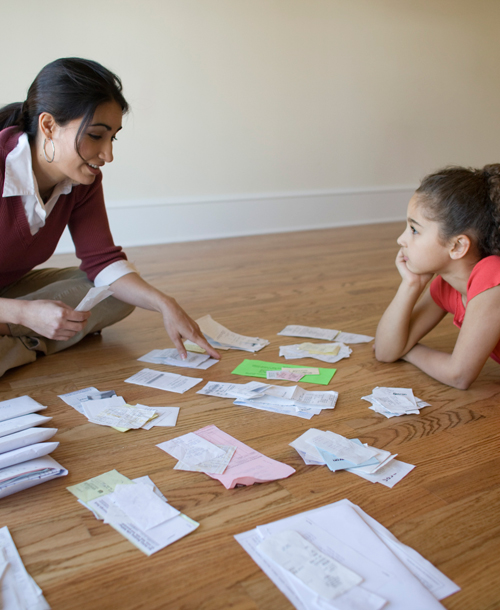Money Matters

If only telling our kids to do as we say and not as we do actually worked—especially when it comes to money. Since finance isn’t really a subject that’s taught in the classrooms these days, your kid may very well be learning everything she’s going to know about money from what you tell her … and from watching what you do. When it comes to setting the best financial example, here are 10 important things that you really want to try your best to never let your kid see you do with money.
Lie About It

If you and your child were at the store together and you bought a brand new scarf, don’t come home and tell your partner you didn’t, says Neale Godfrey, author of Money Doesn’t Grow on Trees: A Parent’s Guide to Raising Financially Responsible Children__. Lying about money sets a dangerous precedent for kids. First, it teaches them that there’s something to be ashamed of when it comes to spending, and it could lead to financial problems in their own relationships down the road. After all, money is one of the top things that couples argue about.
Pay Bills Without Double Checking

Trust us, we know how tedious it can be to sit down with your checkbook and make sure everything’s balanced, or to go through a long restaurant bill to ensure everything is accurate. The truth is, though, humans make mistakes, and double-checking all your bills and tabs is an important part of being fiscally responsible, says Godfrey. Let your child see that you’re a responsible spender by showing her how you take the time to go over all the numbers.
Put Everything in Savings … or Squander It All

Good finances should be all about balance, says Andrea Travillian, author of Little Kids Big Money: Tools for Teaching Kid Friendly Finance. “If you spend all of your money, you are not preparing [for emergencies], and if you save it all then you miss out on lots of experiences,” Travillian says.
Use Money as a Band-Aid

If the first thing you do when you’re feeling sad is run out and splurge on something extravagant, you could be setting your kid up for disastrous spending habits in the future, says Travillian. Impulse and emotional spending are hard behaviors to break, so you really want to try your hardest to keep your kid from developing them in the first place.
Ignore Your Mistakes

As we mentioned before, everyone messes up from time to time … it’s only natural. “Money mistakes are great teaching moments with your kids,” says Travillian. “If you mess up when you purchase a stock, or spend too much on your credit card, use it as an opportunity to discuss the mistake with your kids.” This could potentially help them avoid making the same mistakes themselves when they’re older.
Spend Frivolously

It’s important that you show your kids that you understand that money has value, says Lori Mackey, founder and CEO of Prosperity4Kids, Inc. “Stop wasting your money on things that don’t have value in your life,” she said. “Ask yourself two simple questions: ‘Do I need this, and is it worth it?’ If not, save your money and move on!”
Overspend for Gifts

The true meaning of a gift shouldn’t have anything to do with its value, and Godfrey suggests watching how much you spend when your kids are involved. Teach your children from a young age that it’s the thought behind the gift that matters the most—how much time it took you to make it, the fact that you took time out of your busy schedule to hang out with someone, etc.—and not the price tag attached to it.
Not Give to Charity

This is a big one, says Godfrey. With approximately 77 percent of kids under the age of 17 unaware of whether or not their parents give to charity, obviously we aren’t doing a good enough job of making philanthropy a large part of our kids’ lives. Statistics have shown that parents have a huge impact on whether or not their kids will grow up to be donators, so sit down and have a conversation with them about it today.
Give Them Money for No Reason

Allowance exists for a reason, and it’s to help teach our kids the importance of budgeting and saving. Your children won’t have anyone to lean on for financial security as they become adults, so start teaching them now why they need to stay on top of their own spending and saving.
Shop Without a List

It might seem silly, but heading to the store without a list of items in mind to purchase teaches your kid that he can just buy things without planning. A good way to teach your child about family budgeting is to involve him in the shopping for family dinners. Explain to him that you need money to buy food for everyone, and that you try to keep that food spending to a certain amount of money. Create a list of meal ideas together before you head to the store, and soon your kid will start to understand that everything, even the food he eats, costs money and deserves a budget.



